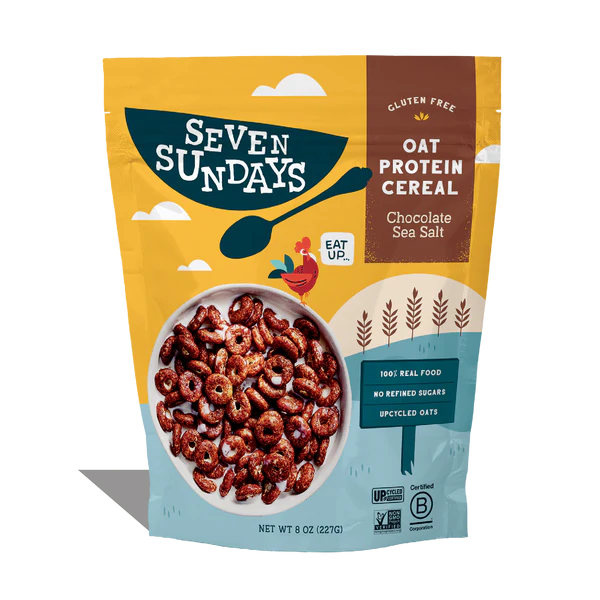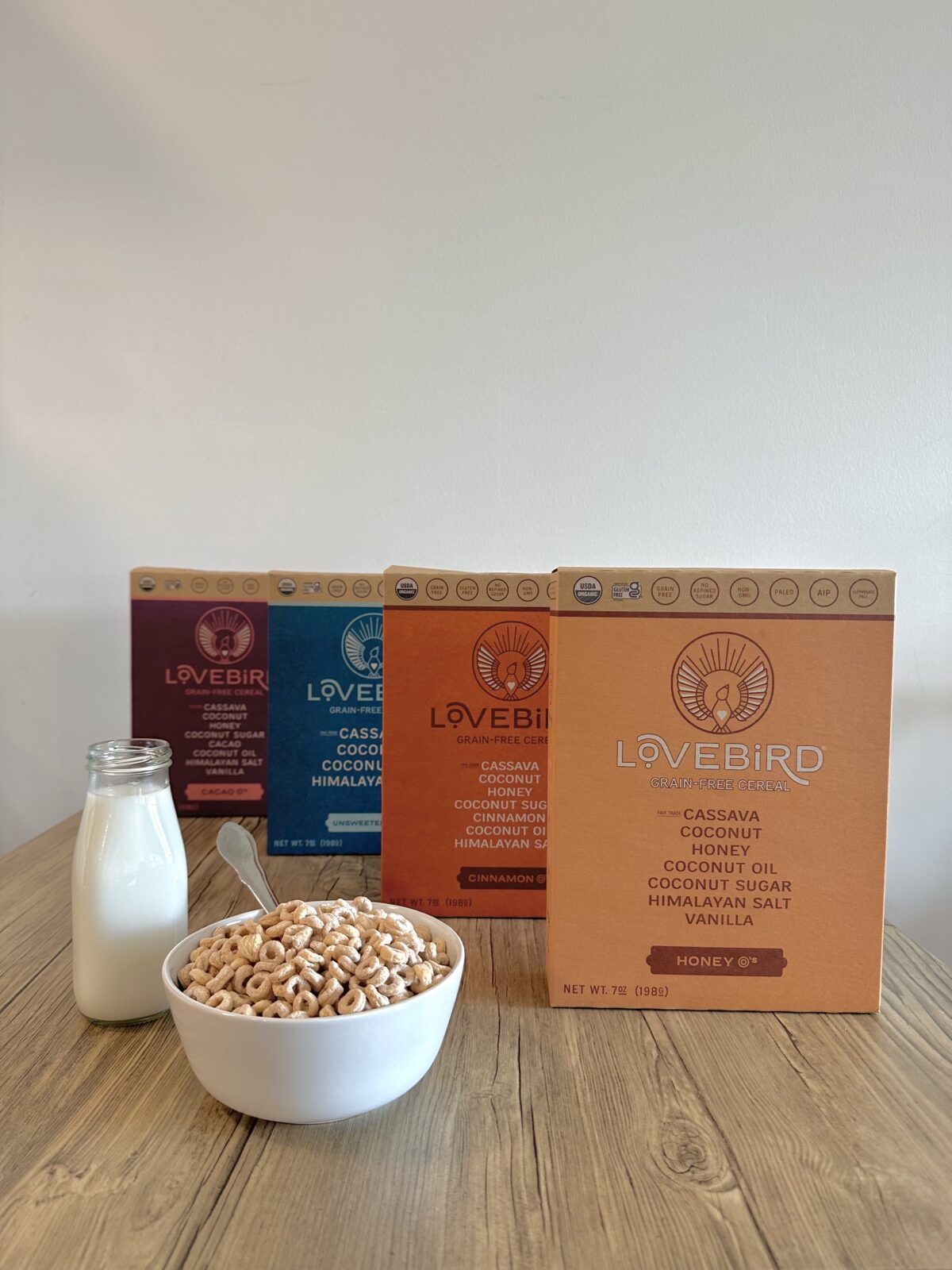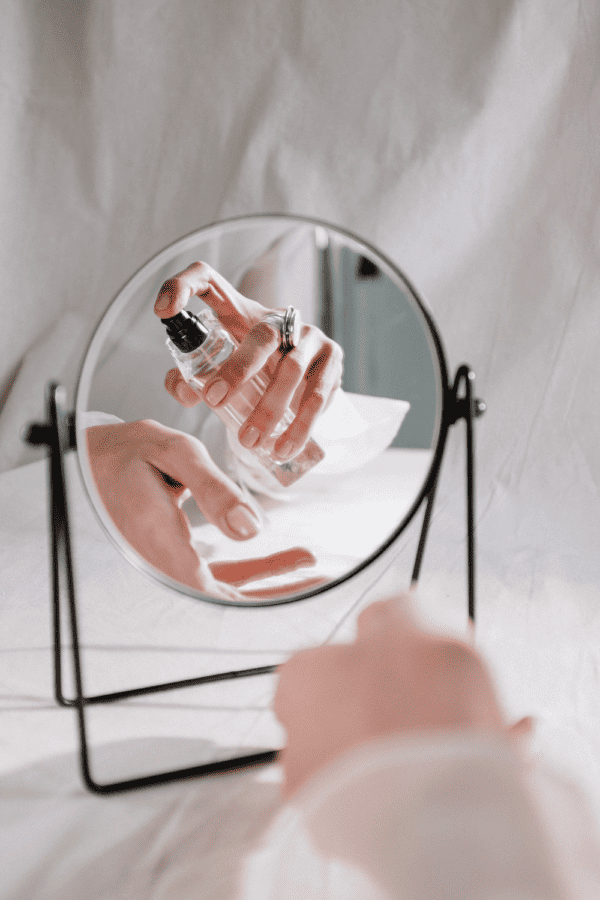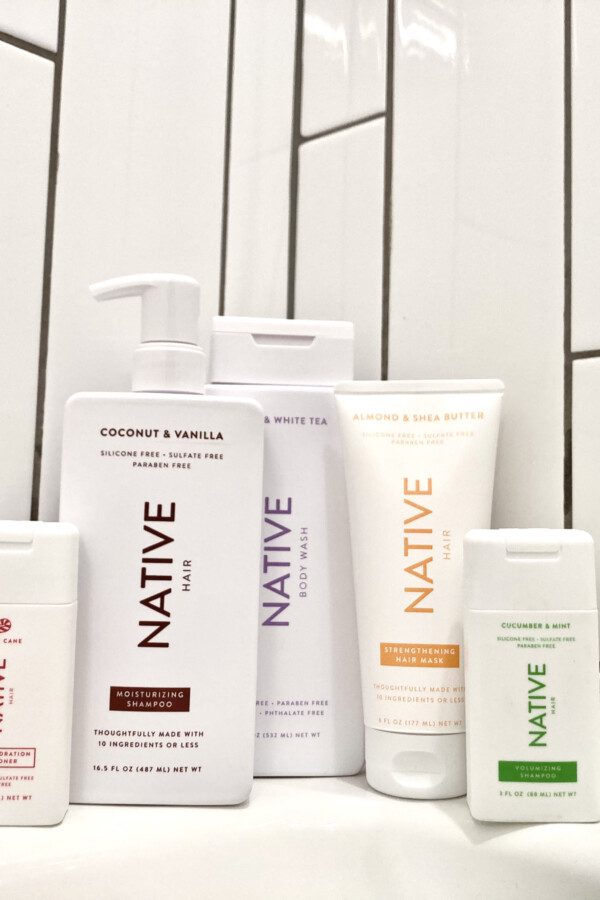Over the past several years, independent testing from organizations like the Center for Environmental Health has found traces of toxicants such as glyphosate and heavy metals in breakfast cereal, oatmeal, and granola.
Unfortunately, glyphosate (and other pesticides) have become ubiquitous, and it’s almost impossible to avoid them completely. That’s why, in order to reduce overwhelm on this low-tox lifestyle journey, I usually recommend that you try to prioritize the things that you do (or consume) regularly over the things you do (or consume) every once in a while.
Since cereal is a daily staple for many people (including kids), it might be beneficial to find a brand that’s not only made from healthy ingredients but is also free from environmental toxicants like pesticides.
So, this article will give you an overview of the issue of pesticide residue in breakfast cereal and will introduce several brands leading the way in the world of healthier and safer breakfast cereals.
Table of Contents
This article contains affiliate links, which means we may earn a commission if you decide to make a purchase.
Featured Image Credit: Lovebird
Glyphosate 101
Before we get into the issue of glyphosate in breakfast cereal, it’s helpful to have a basic understanding of what glyphosate is and why it matters.
Glyphosate is the active ingredient in Roundup (owned by Bayer/Monsanto), which is the most widely used pesticide in the U.S.
(Note that it is an herbicide, which basically means it’s meant to kill weeds, but it’s also a pesticide. That’s because “pesticide” is actually an umbrella term that includes herbicides, insecticides, funcides and other perceived “pests.” This is why you may see glyphosate referred to as both an herbicide and/or a pesticide.)
Glyphosate is meant to be paired with genetically modified (GM) crops. GM crops that are “Roundup Ready” have been genetically modified to be resistant to the negative effects of Roundup. That essentially means that farmers can spray their GM crops with Roundup, and the pesticide is supposed to kill the weeds around the crop without killing the crop itself.
The most commonly grown GM crops in the U.S. are corn and soy, although there are other GM crops too, including sugar beets and canola.
Even though glyphosate is used most heavily with GM crops, it can also be used with other non-GM crops as well. For example, farmers will use it as a pre-harvest desiccant (or drying agent), which helps speed up the harvesting process. This is important to know because most of the primary ingredients used in cereal—like oat and wheat—are actually not GM crops.
In other words, foods like cereal can be made from non-GMO crops but still be treated with pesticides such as glyphosate.
This is most likely why glyphosate residue is being found in breakfast cereal in independent testing.
(There is also the issue of pesticide drift, which is where pesticides sprayed into the air are carried by the wind to an area other than what was intended. For example, if an organic farm is close to a conventional farm that sprays pesticides, then this could result in glyphosate residues in your food—even if it’s grown organically. However, this source of contamination is not likely to be nearly as impactful as pesticides that are purposefully sprayed directly on the crops.)
“Organic” vs. “Non-GMO” vs. “Glyphosate-Free”
These three terms are often used in similar ways, but there are key differentiations:
“Organic” standards prohibit the use of most synthetic pesticides (including glyphosate/Roundup). Organic also prohibits the use of GM crops.
“Non-GMO” means that the seeds used to grow the crop have not been genetically modified. (Note that GMO stands for genetically modified organism. GMO and GM can usually be used interchangeably.)
Non-GMO foods do not have to be organic. A crop can be grown using non-GMO seeds but still treated with pesticides (as discussed above, like when farmers use Roundup on non-Roundup-Ready crops as a desiccant before harvest).
All organic foods are non-GMO, but NOT all non-GMO foods are organic.
This is how you can end up with non-GMO foods that contain glyphosate residues… which is where the “glyphosate-free” distinction comes into play.
Usually, a food can only be determined to be “glyphosate-free” when it’s actually lab tested for detectable levels of glyphosate residue. This is generally either done as a part of investigations by organizations such as the Center for Environmental Health or the Environmental Working Group, or by certification platforms, such as The Detox Project.
Foods that have been certified to be glyphosate-free may or may not be organic.
Potential Health Effects of Glyphosate
If you’re reading this, you’re probably already at least somewhat aware of the potential dangers of ingesting pesticides.
While many pesticides (such as the infamous DDT) have been mostly banned for use in the U.S. due to their toxicity, glyphosate is still allowed, and usage has largely increased over time. Because of its heavy use, it has become ubiquitous in our environment—and our bodies. A 2017 study found a more than 500% increase in glyphosate exposure in just two decades. A 2022 study from the CDC found glyphosate in 80% of U.S. urine samples.
The potential health effects of glyphosate exposure are still quite controversial, so I’m not going to dive too deep into the issue here. But here are the basics:
In 2015, the World Health Organization (WHO) designated glyphosate as “probably carcinogenic to humans” (Group 2A).
It’s specifically linked to a type of cancer called non-Hodgkin lymphoma, and tens of thousands of lawsuits have been filed against Bayer/Monsanto by folks claiming glyphosate caused their cancer. (Most of these lawsuits have been filed by people who have worked directly with the herbicide, such as groundskeepers and farmers.) Many of these lawsuits are still pending, but the chemical giant has already spent billions of dollars in settlements.
But cancer is not the only potential problem with glyphosate. Here are some of the other health problems that research has linked to glyphosate:
- Neurological problems such as ALS
- Endocrine disruption
- Reproductive problems
- Shorter pregnancy (which can lead to a decrease in maternal health outcomes, an increase in infant mortality, an increase in problems as the child grows, and even pre-mature adult death from all causes)
- Increased risk of other diseases later in life, including liver cancer, diabetes, and cardiovascular disease
And it’s not just about the glyphosate, either. Glyphosate is the “active ingredient” in Roundup, making up about half of the formulation. The active ingredient is the only one manufacturers are legally required to put on the label; they don’t even have to tell you what makes up the other half of the solution.
As you can imagine, this makes it incredibly difficult to parse out—or even study—what exactly makes Roundup potentially toxic. Is it the glyphosate itself, another ingredient used, or a combination of multiple ingredients? Some scientists have suggested that these combined ingredients pose an even greater health risk than glyphosate alone.
Because of these concerns, various countries around the world and states within the U.S. have banned Roundup/glyphosate—either completely or in specific contexts (such as in public parks).
Despite all of this, the U.S. EPA continues to say that glyphosate poses no risk to human health when used according to the instructions—a claim that is regularly criticized by many scientists.
If you’d like to take a deep dive into glyphosate concerns, here are a few books I’ve found interesting:
- Seed Money, written by environmental historian Bartow J. Elmore, takes you through Monsanto’s history of producing and dispersing toxic chemicals—from PCBs and Agent Orange all the way to Roundup.
- Whitewash and The Monsanto Papers, both by journalist Carey Gillam, outline Monsanto’s corruption of cover-up surrounding Roundup’s danger.
- For a more science-y book, Toxic Legacy, written by MIT senior research scientist Stephanie Seneff, details the author’s theories about what biological mechanisms may actually be leading to the health problems caused by Roundup.
Is There Weed Killer in Your Breakfast Cereal?
Okay, now let’s get into the issue of glyphosate and CEREAL!
In 2016, two organizations—Food Democracy Now! and The Detox Project—tested a variety of foods and found “alarming levels” of glyphosate in cereals like regular Cheerios, Honey Nut Cheerios, Kellogg’s Corn Flakes, Raisin Bran, and Frosted Flakes.
Then in 2018, the Environmental Working Group (EWG) tested various brands of oat cereals, oatmeal, and granola for glyphosate residue. In their first round of testing, glyphosate was found in all but two of 45 samples of products made with conventionally grown (aka non-organic) oats. Even about one third of 16 samples made with organically grown oats also had glyphosate (but at much lower levels).
In a second round of testing later that year, EWG found glyphosate in all 28 samples of products made with conventionally grown oats. Brands included Quaker, Cheerios, and more.
Around the same time, the Center for Environmental Health did its own testing on breakfast cereals and bars, specifically focusing on the products that are most often served at schools. They found “significant contamination” in 70% of the products they tested, which again included cereal products from big-name brands like Quaker and Cheerios. They did not find glyphosate in any of the certified organic cereals they tested.
It’s not all bad news, though! Although the problem is far from solved, follow-up testing done by EWG in 2022 found that glyphosate in oat-based products has dropped in the last couple of years!
Even though the cause of the drop is not clear, it could be because of the media attention, increased scrutiny, and demand from conscious consumers like yourself who are demanding safer products for themselves and their families.
Where to Find Glyphosate-Free Cereal
Transitioning to glyphosate-free cereal may seem daunting, given the ubiquity of this herbicide. However, the brands mentioned above make it easier by offering a plethora of choices that don’t compromise on taste or quality.
Moreover, making the switch isn’t just beneficial for your health. By supporting these brands, you’re also voting with your wallet—promoting agricultural practices that prioritize both human health and long-term ecological wellbeing.
Lovebird

Highlights: USDA Organic, Certified Gluten Free, Paleo/AIP compliant, Purity Award from Clean Label Project, 20% of profits go to fighting childhood cancer
Lovebird is one of my favorite organic cereal brands by far! Not only is it tasty, but it’s one of the very few brands of cold cereal I’ve been able to find that is both certified organic and third-party verified to be glyphosate-free.
Lovebird currently offers five flavors of “O’s” (which are like Cheerios): Unsweetened, Honey, Cacao, Cinnamon, and Strawberry. The Cacao is my personal favorite (but I’m a sucker for chocolate!). The Unsweetened option is a good choice for babies and toddlers as an organic alternative to regular Cheerios. And the Honey flavor is a great substitute for Honey Nut Cheerios! They’re lighter on sugar compared to Honey Nut Cheerios, so they’re sweet without being overly so.
The team at Lovebird prides itself on utilizing minimal ingredients (without a bunch of extra additives) that support overall health. The main ingredient is organic cassava flour, and they combine that with things like coconut flour, sugar, and oil; raw honey; and Himalayan sea salt. (Everything except the salt is organic!)
Together, these ingredients can be beneficial for gut health, blood sugar balance, and more. They’re also gluten-free and Paleo / AIP compliant. (They are not 100% allergen-free, however, as they contain coconut and are made in a facility that processes soy, milk/dairy, peas, and nuts.)
Perhaps most impressive to me personally is the fact that Lovebird has garnered the Purity Award from the Clean Label Project, which is a third-party award that tests and evaluates products for substances that would never be found on a label (like glyphosate!). Using lab testing, this award not only screens for pesticide residues but also other industrial and environmental contaminants like heavy metals and plasticizers.
I’m personally a big fan of Lovebird’s taste and texture, too. The crunchiness compares to pretty much any other cereal on the market—it’s got a light crunch that’s easy on the palate and not too dense for little ones. I love the taste as well. It’s sweet, but not overly sweet the way a lot of cereal brands are. (Of course, it varies depending on your flavor of choice, too. The Unsweetened variety is obviously less sweet than the other flavors!)
You can check out my full review of Lovebird right here!
Lovebird is available at many retail locations around the U.S., including Fred Meyer, Whole Foods, The Fresh Market, and more. Click here to find the retail store nearest to you.
Or, if you order your Lovebird cereal from their website, you can use the code THEFILTERY15 for 15% off your order.
Body
Lovebird Cereal Review: A Yummy, Healthy, Organic Cheerio Alternative!
Most cereal is filled with processed sugars & other ingredients that aren’t nourishing. But not Lovebird—it’s healthy, organic, and glyphosate-free! Here’s my Lovebird cereal review.
Seven Sundays

Highlights: Upcycled Ingredients, High-Protein, 100% Plant-Based, Certified Glyphosate-Residue-Free by The Detox Project
Seven Sundays is one of the only cereal brands that is certified Glyphosate-Residue-Free by The Detox Project, a research and certification platform that encourages transparency in the food and supplement industries. In order to earn this certification, the products are tested by a third-party lab in order to verify that the final product does not contain any detectable levels of glyphosate residue.
(Not ALL of their products come with this certification, but many of them do. You can find out the most up-to-date list of which Seven Sundays products are Glyphosate-Residue-Free by typing “Seven Sundays” in the search bar on this page.)
It’s worth noting, however, that although most of Seven Sundays’ varieties are certified to be free from glyphosate residues, they are not all certified organic. This is in part because of the fact that they actually use upcycled ingredients in order to reduce food waste! For example, their oat protein ingredient is a byproduct of the oat milk industry. This makes it more difficult to certify the products as organic, which is why the Glyphosate-Residue-Free certification is all the more important!
They have quite a few different options to choose from, including your traditional Cheerio alternatives, along with Muesli, oatmeal, and granola. Flavors include things like Cacao, Maple Almond, Cinnamon, Super Fruity, Real Berry, and more. Check the specific product pages to find out which ones fit your specific priorities, like organic, Glyphosate-Residue-Free, high protein, keto, etc.
Seven Sundays cereal is not 100% allergen-friendly, as their production facilities share lines with peanuts, tree nuts, dairy, and soy (although they take steps to prevent cross-contamination). While none of their products use that contain gluten, only some of them are certified gluten-free. You can find out more here.
Seven Sundays is available at in-store retailers such as Fresh Thyme and Whole Foods, as well as online retailers like Hive and Thrive Market. You can also save money by signing up for the “Cereal Club” (which is their subscription option).
One Degree Organic

Highlights: USDA Organic, BioChecked Non-Glyphosate Certified™, Certified Vegan, Gluten Free
Although they are perhaps better known for their hot cereals like oatmeal, One Degree Organic also carries a couple of cold rice cereal options. Their Sprouted Rice Crisps (which come in regular and cacao) are a great organic alternative to Rice Krispies!
These cereals come with a handful of third-party certifications, including USDA Organic and BioChecked Non-Glyphosate Certified™ (which is another third-party glyphosate test).
They go even further by making their supply chain as transparent as possible. On each box of cereal, you’ll find a QR code, which you can scan to find out more about where all of the different ingredients came from. (Alternatively, you can track the products by entering the 6-digit clean source code from the package.) You can actually read or watch a story about the specific farm that each ingredient came from! This is where the name “One Degree Organic” originates… They want to connect you, the customer, to the farmer who grew your food—so you’re connected to them by one degree!
One Degree Organic Foods also carries other products, such as bread, flour, seeds, and granola.
You can buy One Degree Organic on their website as well as online and in-store retail locations like Kroger, Whole Foods, Fresh Thyme, and more.
ZEGO

Highlights: Certified USDA organic, traceability and purity testing, certified Gluten Free
Although ZEGO doesn’t specifically offer Cheerio alternatives, they do have USDA certified organic old-fashioned rolled oats and Muesli. The Muesli can be enjoyed as a cold cereal, or you can eat it hot!
ZEGO not only conducts purity testing through a third-party lab (AGQ Labs & Technological Services), but they actually share those test results with their customers. They test for glyphosate as well as over 400(!) other chemicals, including other kinds of pesticides, heavy metals, and allergens (like gluten and peanuts).
Every ZEGO product you buy will contain a QR code, which you can scan with your phone and find the test results!
ZEGO is also more allergy-friendly than many other brands. Their manufacturing facility is gluten-free and free of the top allergens. Their bagged products are made in a facility that’s free of the top 14 allergens (including corn), and their bars are made in a facility that is free of the top 9 allergens.
You can order ZEGO from Vitacost or at Natural Grocers stores.
Even More Options for Organic Oats & Cereals
The following brands didn’t necessarily make our “best of” list when it comes to organic and glyphosate-free Cheerio alternatives, but they’re still pretty good options, depending on what you’re looking for!
Cascadian Farm (which is now owned by General Mills) is a good option for organic cereal—they have O’s, puffs, flakes, squares, and more. They also carry similar products like granola, bars, and frozen produce. It’s all certified USDA organic, but unfortunately, it does not come with any glyphosate testing. There was only one Cascadian Farm product tested in the independent investigations outlined above, which was their Organic Honey Nut O’s (tested by the Center for Environmental Health). But the good news is that glyphosate was not detected!
Nature’s Path (along with their sub-brands—Nature’s Path, EnviroKidz, Love Crunch, Que Pasa, and Qi’a) offers a wide variety of organic cereals, including flakes, brans, O’s, puffs, crispies, and more. They are all USDA certified organic, but they do not come with any third-party testing certifications for glyphosate. EWG’s 2018 investigation tested two Nature’s Path products for glyphosate: the Organic Honey Almond Granola and the Organic Rolled Oats. They did not find any glyphosate in the Granola, but they did find a minimal amount of glyphosate in the rolled oats. (None of Nature’s Path’s products were tested again in the 2022 follow-up.) Overall, I would say that Nature’s Path is a pretty good option, especially considering it’s widely available at a lot of retail grocery stores.
Back Roads Organic is also USDA Organic and Glyphosate-Residue-Free by The Detox Project. They don’t carry cold cereal, but they do have gluten-free oats (to make hot cereal) as well as granola.
MUSH also does not have cold cereal, but they do offer single-serving overnight oats. They are not organic, but several of their varieties are certified Glyphosate-Residue-Free by The Detox Project. (They’re also gluten-free and dairy-free.)
Red Tractor also offers oatmeal (no cold cereal) that is certified Glyphosate-Residue-Free by The Detox Project. It’s not organic.
Else does not carry products for adults, but they do offer cereals, formulas, and shakes for babies and kids from 6 months to 13 years old. They’ve earned the Purity Award from the Clean Label Project (which means it’s been tested for glyphosate and other toxicants), and they are also certified USDA organic and FODMAP-friendly.
Baby Gourmet is another brand that offers organic cereals and other snacks for little ones. They have also earned the Purity Award from the Clean Label Project.
Similarly, Ready. Set. Food. is another brand that offers baby cereals and formulas that are USDA organic and have garnered the Clean Label Project’s Purity Award.
Once Upon a Farm offers a variety of squeezable pouches for kids, including overnight oats and fruit/veggie blends. They are also certified USDA organic and have earned the Clean Label Project’s Purity Award.
Final Thoughts About the Weed Killer in Your Breakfast Cereal
In the grand scheme of things, choosing a cereal might seem trivial. And if you only eat it every once in a while, I wouldn’t worry too much about it!
But if cereal is a part of your or your kids’ daily diet, then you might want to ditch the sugary staples and try out some of the organic and glyphosate-free options listed above!
Glyphosate-free cereals are not just a trend but a testament to an evolving consumer consciousness. The brands highlighted in this article offer more than just breakfast; they offer peace of mind. By making informed choices, we can pave the way for a more transparent, healthy, and sustainable future in agriculture and in our kitchens.
To stay updated on the latest glyphosate-related news and get more low-tox lifestyle tips delivered to your inbox once a week, sign up for Filtered Fridays!





